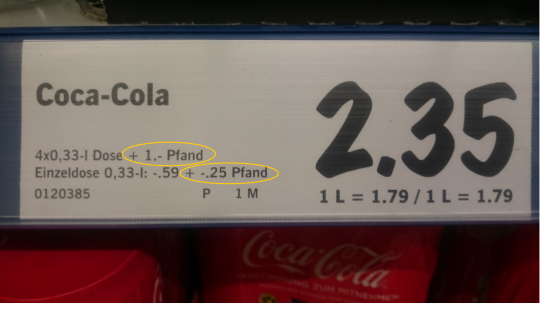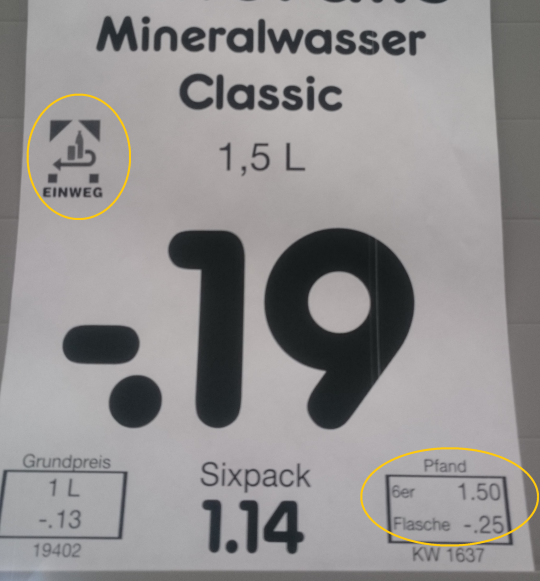Recycling your bottles in Germany – A guide to get your money back.

Recycling machines for empty bottles in a German supermarket
Have you ever found yourself standing in front of a cashier with a confused expression on your face and wondering about unexpected price increases ?
Well, this situation can occur when you buy bottled or canned drinks in Germany for the first time without being aware of the recycling process.
In this post, we take a look at the different types of bottles and the “deposit” that is charged at every checkout.
You will also get an explanation on how to return them to get your money back.
Einweg bottles and cans

Pfand logo on a German beer bottle
Certain plastic bottles and cans will be shredded and recycled (Einweg), and therefore come with an extra “deposit” (Pfand).
Pay attention to the “Pfand logo” on the imprint or backside to identify them.
The logo means that a 0,25€ deposit is added to the price of the drink at the checkout.
If you buy for example a six-pack of bottled water with that logo, the cashier will calculate the deposit for each bottle, meaning you need to have an extra 1,50€ (=6×0,25€) in your pocket to pay for all six bottles, on top of the actual price for the water.
In some cases the deposit for an empty bottle can be higher than the actual price for water (or any other drink).
Another way to identify “Einweg” bottles or cans is a closer look on the price tag with the following note: zzgl. 0,25€, zuzüglich Pfand, zzgl. Pfand, +0,25, etc.


Return Einweg plastic bottles/cans and get your deposit back
- Bottles and cans with a Pfand logo can be returned at any supermarket of your choice. Collecting machines are either available in front of the entrance or inside the supermarket. In some cases they are located in a nearby booth. Some offer a navigation bar in English.
- A lot of people like to squeeze plastic bottles and cans to fit more in a bag, thereby damaging or wrinkling the Pfand symbol. However, if the logo is not recognizable, the scanner will not be able to read it, reject your bottle/can and stop the recycling process. Consequently, you will lose your money unless you put the bottle/can back into its shape so the logo is “scannable” again. Blowing air inside a bottle might do the trick.
- Put one after another and the screen on the side will display the value that is added to your total deposit for each bottle/can you put in.
- Once you are finished you have two options:
– press “spenden” to donate the total deposit for a good cause
– or press the other button to print out a receipt, displaying the total value of all recycled bottles in €
Redeem this receipt by putting it on the conveyor belt together with your grocery items. Its value will be then deducted from your final receipt. If you have nothing to buy, you just hand it over to the cashier and he will return you the money.
Keep in mind that the receipt is only valid at the supermarket where you have recycled the bottles.
Here we have an enthusiastic “bottle recycler”
For more demo videos click here
What if a recycling machine is not working?
Situation 1. The machine is full:
If you come across a machine with a “stop” sign on its display, the inside container has reached its maximum capacity and needs to be emptied.
If you are lucky, the system will automatically notify an employee.
If not, you are forced to walk into the supermarket with your bags full of empty bottles/cans. Unfortunately, there is no way around other than requesting help from employees.
Situation 2. The machine is defect
If the recycling machine is completely broken/defect and there are no other machines left, you are most likely required to place the bottles on the conveyor belt together with your grocery. The cashier will manually count and dispose each bottle in a big cardboard. Again, the total deposit will be deducted from your final receipt.
What about Mehrweg bottles?
 Glass and plastic bottles that will be reused (Mehrweg) have a Pfand deposit ranging from 0,08 € to 0,15 €.
Glass and plastic bottles that will be reused (Mehrweg) have a Pfand deposit ranging from 0,08 € to 0,15 €.
They don’t have a specific logo.
However, you can identify them if you spot the word “Mehrweg” on the imprint or price tag.
You will often find Mehrweg bottles among beer, water and soft drinks.
Compared to Einweg bottles, Mehrweg bottles are more complicated to return. There are no official regulations for supermarkets to take them back. The common rule is to return them at the place where you bought them.
It’s best to take your receipt with you as a proof of your purchase and ask a clerk for your deposit.
Some supermarkets have their separate beverage store (Getränkemarkt) nearby where you can bring these bottles for a deposit return. This is also the place where you can return Einweg-bottles if the supermarket doesn’t have a machine.
This hassle is the main reason why most Germans try to avoid Mehrweg bottles.
What about other bottles?
Plastic/glass bottles and cans without an Einweg logo or Mehrweg indication are not charged a recycling deposit.
You are supposed to throw them away, ideally in an appropriate recycling bin
Colored glass bottles should be disposed of separately (green, brown, transparent )

Yellow recycling bins are for plastic bottles/packaging.
